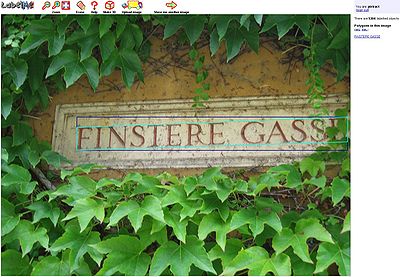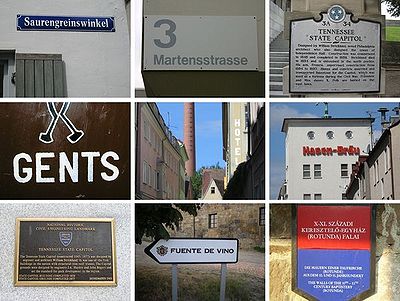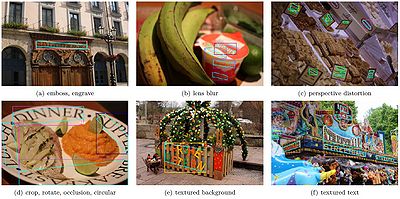NEOCR: Natural Environment OCR Dataset
Datasets -> Datasets List -> Current Page
|
Contents
Contact Author
Robert Nagy University of Erlangen-Nuremberg Chair for Computer Science 6 (Data Management) Matrensstr. 3 D-91058 Erlangen Germany Email: robert[dot]nagy [at] cs[dot]fau[dot]de
Current Version

1.0 (also available from the NEOCR Web site)
Keywords
OCR, Natural Scene, Scene Text, Word Spotting, Scene Text Recognition, Scene Text Detection, Scene Text Localization
Description
The NEOCR dataset contains 659 real world images with 5238 annotated bounding boxes (textfields). The images were taken by several people independently from the dataset, so the dataset covers a broad range of characteristics which distinguish real world images from scanned documents. All text recognizable by humans has been annotated for all images. The dataset creation process was stopped when for each metadata dimension at least 100 textfields were included in the dataset.
The ground truth contains not only the visible text, but also distortion quadrangles, which enclose the visible text much more precisely than bounding boxes. The dataset is enriched with metadata consisting of brightness, contrast, inversion, texture, resolution, noise, blur, distortion, rotation, character arrangement, occlusion, typeface and language information. The annotation is provided in XML based on the schema of LabelMe.
Metadata and Ground Truth Data
The annotation was created manually by an adaptation of the LabelMe annotation tool. All text visible and recognizable by humans has been annotated for all images. The annotation is provided in XML, the schema of LabelMe was extended to our needs. The extended XMLschema is also provided as part of the dataset. Metadata is provided globally and locally.
Global image metadata includes the filename, folder, source information, image width, height, depth, brightness and contrast. Textfield (local, bounding box) metadata contains the visible text and optical, geometrical and typographical characteristics. Bounding boxes are rectangular and parallel to the axes. Additionally distortion quadrangles are provided which enclose the visible text more precisely.
Optical characteristics include texture, brightness, contrast, inversion, resolution, noise and blur information. Texture, noise and inversion were annotated manually, the rest was computed automatically using ImageMagick. Geometrical characteristics cover distortion, rotation, character arrangement and occlusion information. Typographical characteristics contain typeface and language metadata. Please see the CBDAR paper [1] or the technical report for further details on the metadata.
Related Tasks
References
- R. Nagy, A. Dicker and K. Meyer‐Wegener, "NEOCR: A Configurable Dataset for Natural Image Text Recognition". In CBDAR Workshop 2011 at ICDAR 2011. pp. 53‐58, September 2011. (PDF), (Presentation)
- R. Nagy, A. Dicker, and K. Meyer‐Wegener, "Definition and Evaluation of the NEOCR Dataset for Natural‐Image Text Recognition". University of Erlangen, Dept. of Computer Science, Technical Reports, CS‐2011‐07, September 2011. (PDF)
Submitted Files
Disclaimer
By downloading and using the dataset you agree to acknowledge it's source and cite the above papers in related publications. Please link to the authors' Web page of the set as http://www6.cs.fau.de/neocr.
Version 1.0
- The complete NEOCR dataset with annotations (XXXX KB)
- Disjoint split of the NEOCR images for training and testing Test Set Image Listing (5 KB), Training Set Image Listing (5 KB)
- The NEOCR XML-Schema definitions for the annotations (10 KB)
- NEOCR Metadata Documentation PDF (7.5 MB)
This page is editable only by TC11 Officers .

